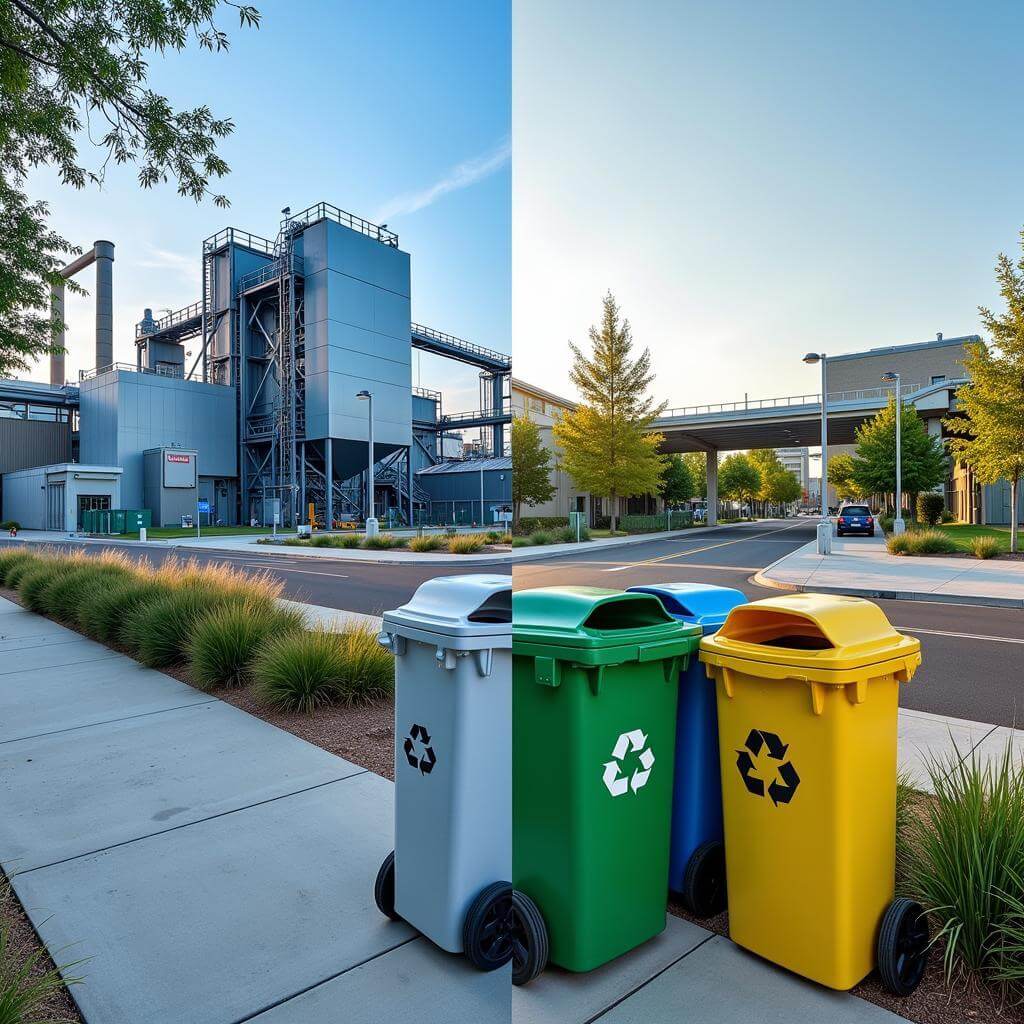Recycling and environmental conservation have become increasingly important topics in IELTS Writing Task 2 essays. The question of whether recycling should be incentivized financially is a recurring theme, appearing in various forms across recent test papers. Based on trends observed in past exams, it’s highly likely that this topic will continue to feature prominently in future IELTS tests.
Let’s examine a relevant question that has appeared in recent IELTS exams:
Some people believe that the government should offer financial rewards to people who recycle household waste. Others argue that this is unnecessary and there are better ways to encourage recycling. Discuss both views and give your own opinion.
Analyzing the Question
This question requires candidates to:
- Discuss the view that governments should provide financial incentives for recycling
- Explore alternative methods to encourage recycling
- Present their own opinion on the most effective approach
The essay should be balanced, addressing both perspectives before concluding with a personal stance.
Sample Essay 1 (Band 8-9)
Waste management is a critical issue facing modern societies, and recycling plays a pivotal role in addressing this challenge. While some advocate for financial incentives to boost recycling rates, others contend that alternative methods are more effective. This essay will examine both viewpoints before presenting my own perspective on the matter.
Proponents of financial rewards argue that monetary incentives can significantly increase participation in recycling programs. They believe that offering cash or tax rebates for recycling household waste would motivate more people to sort their garbage and contribute to environmental conservation. For instance, in Germany, the introduction of a bottle deposit system led to a substantial increase in recycling rates, with over 98% of plastic bottles now being recycled. This success story demonstrates the potential effectiveness of financial incentives in promoting sustainable behavior.
On the other hand, critics of this approach argue that relying on financial rewards is unsustainable and may not address the root cause of the problem. They contend that education and awareness campaigns are more effective in fostering a long-term commitment to recycling. By instilling environmental values and explaining the importance of waste reduction, these initiatives can create a culture of responsibility that extends beyond mere financial motivation. Additionally, improving infrastructure for recycling, such as providing convenient collection points and streamlining the sorting process, can make recycling easier and more accessible for everyone.
In my opinion, while financial incentives can be a useful tool in jumpstarting recycling habits, they should not be the sole or primary method of encouraging this behavior. I believe that a comprehensive approach combining education, infrastructure improvements, and targeted financial rewards would be most effective. By educating people about the environmental impact of waste and providing them with the necessary tools and knowledge to recycle effectively, we can create a more sustainable and long-lasting change in behavior. Financial incentives could then be used strategically to target specific materials or areas where recycling rates are particularly low, rather than as a blanket policy.
In conclusion, while financial rewards for recycling can yield quick results, a multi-faceted approach that emphasizes education and infrastructure development, supplemented by strategic financial incentives, is likely to be more effective in promoting long-term, sustainable recycling habits among the population.
Sample Essay 2 (Band 6-7)
The question of whether governments should give money to people who recycle their household waste is a topic of debate. Some people think it’s a good idea, while others believe there are better ways to encourage recycling. In this essay, I will discuss both sides and give my opinion.
Those who support financial rewards for recycling argue that it would motivate more people to do it. They think that if people can get money for recycling, they will be more likely to separate their waste and take it to recycling centers. This could lead to higher recycling rates and less waste in landfills. For example, in some countries, people can get money back when they return bottles and cans, which has been successful in increasing recycling.
However, others argue that giving money for recycling is not necessary and might not work in the long term. They believe that it’s better to focus on educating people about why recycling is important for the environment. By teaching people about the benefits of recycling and the problems caused by too much waste, they think more people will recycle because they want to, not just for money. Also, they suggest that making recycling easier by providing more bins and collection services could be more effective.
In my opinion, I think a combination of approaches would work best. While financial rewards might encourage some people to start recycling, I believe education and better recycling facilities are more important in the long run. If people understand why recycling matters and find it easy to do, they are more likely to make it a habit, even without getting paid for it.
To conclude, although financial incentives for recycling can have some benefits, I believe that educating people and improving recycling infrastructure are more effective ways to encourage long-term recycling habits.
Sample Essay 3 (Band 5-6)
Some people think the government should give money to people who recycle their home waste. Other people say this is not needed and there are better ways to make people recycle. I will talk about both ideas and give my opinion.
People who like the idea of giving money for recycling think it will make more people do it. If people can get money for recycling their trash, they might do it more. This could help the environment because less trash would go to landfills. In some places, people get money for returning bottles, and this has worked well.
But other people think giving money for recycling is not a good idea. They say it’s better to teach people why recycling is important. If people know how recycling helps the earth, they might do it without needing money. These people also think making recycling easier, like having more recycling bins, is a better way to help.
I think both ideas have good points. Giving money might make some people start recycling, which is good. But teaching people about recycling and making it easier to do are also important. Maybe using all these ideas together would work best.
In conclusion, I believe that while giving money for recycling could help, teaching people about recycling and making it easier to do are more important for making people recycle more in the long term.
 Recycling facilities and infrastructure
Recycling facilities and infrastructure
Explanation of Band Scores
Band 8-9 Essay:
This essay demonstrates:
- Clear organization with a well-developed argument
- A wide range of vocabulary used accurately (e.g., “pivotal role,” “sustainable behavior”)
- Complex sentence structures with good control
- Cohesive devices used effectively
- A clear position with well-supported ideas
Band 6-7 Essay:
This essay shows:
- Clear overall progression, though not always well-developed
- Sufficient vocabulary to discuss the topic, with some attempts at less common words
- A mix of simple and complex sentence structures
- Some cohesive devices, though not always used effectively
- A position is presented, but supporting ideas could be more fully developed
Band 5-6 Essay:
This essay exhibits:
- Basic organization, but limited development of ideas
- Adequate vocabulary for simple ideas, but limited range
- Mostly simple sentences with some errors
- Basic cohesive devices, often repetitive
- An attempt to present a position, but lacks clear support
Key Vocabulary to Remember
- Incentivize (verb) /ɪnˈsentɪvaɪz/ – to encourage or motivate someone to do something
- Sustainable (adjective) /səˈsteɪnəbl/ – able to be maintained at a certain rate or level
- Infrastructure (noun) /ˈɪnfrəstrʌktʃər/ – the basic physical and organizational structures and facilities
- Pivotal (adjective) /ˈpɪvətl/ – of crucial importance in relation to the development or success of something else
- Comprehensive (adjective) /ˌkɒmprɪˈhensɪv/ – including or dealing with all or nearly all elements or aspects of something
- Multi-faceted (adjective) /ˌmʌltɪˈfæsɪtɪd/ – having many different aspects or features
- Streamline (verb) /ˈstriːmlaɪn/ – make (an organization or system) more efficient and effective
- Landfill (noun) /ˈlændfɪl/ – a site for the disposal of waste materials by burial
- Jumpstart (verb) /ˈdʒʌmpstɑːt/ – to start or restart something quickly or forcefully
- Blanket policy (noun) /ˈblæŋkɪt ˈpɒləsi/ – a policy that applies to all cases or situations without exception
In conclusion, the topic of financial incentives for recycling is likely to remain relevant in future IELTS Writing Task 2 exams. To prepare effectively, practice writing essays on related themes such as:
- The role of individual responsibility vs. government action in environmental protection
- The effectiveness of different types of environmental policies
- Balancing economic growth with environmental conservation
Remember to structure your essays clearly, use a range of vocabulary and sentence structures, and support your arguments with relevant examples. Good luck with your IELTS preparation!
We encourage you to practice writing your own essay on this topic and share it in the comments section below. This is an excellent way to improve your writing skills and receive feedback from others preparing for the IELTS exam.


